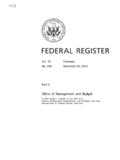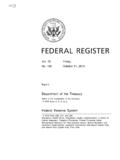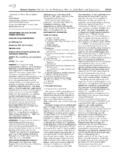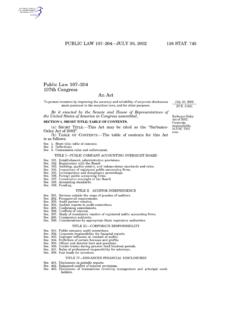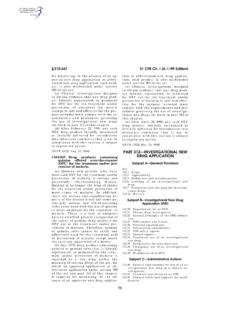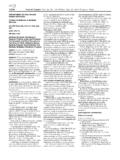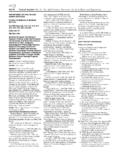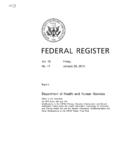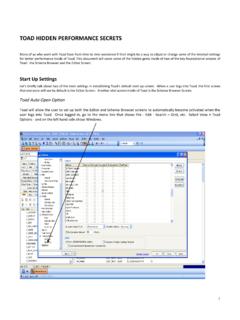Transcription of Federal Register /Vol. 76, No. 176/Monday, September 12 ...
1 56227 Federal Register / Vol. 76, No. 176 / Monday, September 12, 2011 / Notices nonresponse in key Bureau surveys. Moreover, as the use of Web-based surveys continues to grow, so too will the need for careful tests of instrument design and usability, human-computer interactions, and the impact of multiple modes on data quality. The BSRL is uniquely equipped with both the skills and facilities to accommodate these demands. The extension of the accompanying clearance package reflects an attempt to accommodate the increasing interest by BLS program offices and other agencies in the methods used, and the results obtained, by the BSRL. This package reflects planned research and development activities for FY2012 through FY2014, and its approval will enable the continued productivity of a state-of-the-art, multi-disciplinary program of behavioral science research to improve BLS survey methodology.
2 III. Desired Focus of Comments The Bureau of Labor Statistics is particularly interested in comments that: Evaluate whether the proposed collection of information is necessary for the proper performance of the functions of the agency, including whether the information will have practical utility. Evaluate the accuracy of the agency s estimate of the burden of the proposed collection of information, including the validity of the methodology and assumptions used. Enhance the quality, utility, and clarity of the information to be collected. Minimize the burden of the collection of information on those who are to respond, including through the use of appropriate automated, electronic, mechanical, or other technological collection techniques or other forms of information technology, , permitting electronic submissions of responses. Type of Review: Extension of a currently approved collection.
3 Agency: Bureau of Labor Statistics. Title: Cognitive and Psychological Research. OMB Number: 1220 0141. Affected Public: Individuals and Households, Private Sector. Total Respondents: 1,200. Frequency: One time. Total Responses: 1,200. Average Time per Response: 60 minutes. Estimated Total Annual Burden Hours: 1,200 hours. Total Burden Cost (capital/startup): $0. Total Burden Cost (operating/ maintenance): $0. Comments submitted in response to this notice will be summarized and/or included in the request for Office of Management and Budget approval of the information collection request; they also will become a matter of public record. Signed at Washington, DC this 31st day of August 2011. Kimberley D. Hill, Chief, Division of Management Systems, Bureau of Labor Statistics. [FR Doc. 2011 23209 Filed 9 9 11; 8:45 am] BILLING CODE 4510 24 P OFFICE OF MANAGEMENT AND BUDGET Office of Federal Procurement Policy Publication of the Office of Federal Procurement Policy (OFPP) Policy Letter 11 01, Performance of Inherently Governmental and Critical Functions AGENCY: Office of Management and Budget, Office of Federal Procurement Policy.
4 ACTION: Notice of final policy letter. SUMMARY: The Office of Federal Procurement Policy (OFPP) in the Office of Management and Budget (OMB) is issuing a policy letter to provide to Executive Departments and agencies guidance on managing the performance of inherently governmental and critical functions. The guidance addresses direction to OMB in the Presidential Memorandum on Government Contracting, issued on March 4, 2009, to clarify when governmental outsourcing of services is, and is not, appropriate, consistent with section 321 of the Duncan Hunter National Defense Authorization Act (NDAA) for Fiscal Year 2009 (Pub. L. 110 417). Section 321 requires OMB to: (i) Create a single definition for the term inherently governmental function that addresses any deficiencies in the existing definitions and reasonably applies to all agencies; (ii) establish criteria to be used by agencies to identify critical functions and positions that should only be performed by Federal employees; and (iii) provide guidance to improve internal agency management of functions that are inherently governmental or critical.
5 The Presidential Memorandum is available at the_press_office/Memorandum-for-the- Heads-of-Executive-Departments-and- Agencies-Subject-Government/. Section 321 may be found at http:// 2009 NDAA_PL110 DATES: The effective date of OFPP Policy 11 01 is October 12, 2011. FOR FURTHER INFORMATION CONTACT: Mathew Blum, OFPP, (202) 395 4953 or or Jennifer Swartz, OFPP, (202) 395 6811 or SUPPLEMENTARY INFORMATION: A. Overview OFPP is issuing a policy letter to provide guidance on managing the performance of inherently governmental and critical functions. The policy letter is intended to implement direction in the President s March 4, 2009, Memorandum on Government Contracting that requires OMB to clarify when governmental outsourcing for services is and is not appropriate, consistent with section 321 of Public Law 110 417 (31 501 note). The policy letter: Clarifies what functions are inherently governmental and must always be performed by Federal employees.
6 The policy letter provides a single definition of inherently governmental function built around the well-established statutory definition in the Federal Activities Inventory Reform Act (FAIR Act), Public Law 105 270. The FAIR Act defines an activity as inherently governmental when it is so intimately related to the public interest as to mandate performance by Federal employees. The definition provided by this policy letter will replace existing definitions in regulation and policy, including the Federal Acquisition Regulation (FAR). The policy letter provides examples and tests to help agencies identify inherently governmental functions. Explains what agencies must do when work is closely associated with inherently governmental functions. Specifically, when functions that generally are not considered to be inherently governmental approach being in that category because of the nature of the function and the risk that performance may impinge on Federal officials performance of an inherently governmental function, agencies must give special consideration to using Federal employees to perform these functions.
7 If contractors are used to perform such work, agencies must give special management attention to contractors activities to guard against their expansion into inherently governmental functions. The policy letter includes examples to help agencies identify closely associated functions and a checklist of responsibilities that must be carried out VerDate Mar<15>2010 16:36 Sep 09, 2011 Jkt 223001 PO 00000 Frm 00087 Fmt 4703 Sfmt 4703 E:\FR\FM\ 12 SEN1mstockstill on DSK4 VPTVN1 PROD with NOTICES56228 Federal Register / Vol. 76, No. 176 / Monday, September 12, 2011 / Notices when agencies rely on contractors to perform these functions. Requires agencies to identify their critical functions in order to ensure they have sufficient internal capability to maintain control over functions that are core to the agency s mission and operations.
8 The policy letter holds an agency responsible for making sure it has an adequate number of positions filled by Federal employees with appropriate training, experience, and expertise to understand the agency s requirements, formulate alternatives, manage work product, and monitor any contractors used to support the Federal workforce. Federal officials must evaluate, on a case-by-case basis, whether they have sufficient internal capability, taking into account factors such as the agency s mission, the complexity of the function, the need for specialized staff, and the potential impact on mission performance if contractors were to default on their obligations. Outlines a series of agency management responsibilities to strengthen accountability for the effective implementation of these policies. Agencies must take specific actions, before and after contract award, to prevent contractor performance of inherently governmental functions and overreliance on contractors in closely associated and critical functions.
9 Agencies are also required to develop agency-level procedures, provide training, and designate senior officials to be responsible for implementation of these policies. OFPP will work with the Federal Acquisition Regulatory Council, the Defense Acquisition Regulations Council and the Civilian Agency Acquisition Council to develop and implement appropriate changes to the FAR to implement this policy letter. In addition, OFPP will review other relevant policy documents, such as guidance in OMB Circular A 76 implementing the FAIR Act, and take appropriate action to ensure they conform to the policies in this letter. Finally, OFPP will work with the Federal Acquisition Institute and the Defense Acquisition University on appropriate training materials for the acquisition workforce and other affected stakeholders. B. Summary of Proposed and Final Policy Letters The Presidential Memorandum on Government Contracting required the Director of OMB to develop guidance addressing when governmental outsourcing of services is, and is not, appropriate.
10 The Memorandum states that the line between inherently governmental activities that should not be outsourced and commercial activities that may be subject to private-sector performance has become blurred, which may have led to the performance of inherently governmental functions by contractors and, more generally, an overreliance on contractors by the government. It directs OMB to clarify when outsourcing is, and is not, appropriate, consistent with section 321 of the NDAA for Fiscal Year (FY) 2009. Section 321 directs OMB to: (1) Create a single, consistent definition for the term inherently governmental function that addresses any deficiencies in the existing definitions and reasonably applies to all agencies; (2) develop criteria for identifying critical functions with respect to the agency s mission and operations; (3) develop criteria for determining positions dedicated to critical functions which should be reserved for Federal employees to ensure the department or agency maintains control of its mission and operations; (4) provide criteria for identifying agency personnel with responsibility for (a) maintaining sufficient expertise and technical capability within the agency, and (b) issuing guidance for internal activities associated with determining when work is to be reserved for performance by Federal employees.
